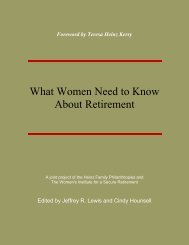What Women Need to Know About Retirement - Wiser
What Women Need to Know About Retirement - Wiser
What Women Need to Know About Retirement - Wiser
Create successful ePaper yourself
Turn your PDF publications into a flip-book with our unique Google optimized e-Paper software.
Now that’s a smart financial move.<br />
But what about the mortgage interest tax deduction? A tax deduction is no reason <strong>to</strong> prolong<br />
your mortgage payments! Think of it this way—if you were a professional gambler, your<br />
gambling losses would be tax deductible. But does that mean a gambler wants <strong>to</strong> lose money?<br />
No way!<br />
Still not convinced? Consider the math. Let’s say you are paying $1,000 a month <strong>to</strong>wards your<br />
mortgage; $700 goes <strong>to</strong> interest and $300 goes <strong>to</strong> principle. You would save around $175 on<br />
your taxes. So you want <strong>to</strong> keep paying $1,000 <strong>to</strong> the bank so you can save $175? Of course<br />
not. Math like that will drive you <strong>to</strong> the poorhouse in a hurry. As a friend of ours once said,<br />
“The problem with tax deductions is that they are like paper <strong>to</strong>wels. You have <strong>to</strong> spill your own<br />
milk (make the payments) before they help you sop up some of it.”<br />
But what if you plan <strong>to</strong> sell your house? If you sell your house, you walk away with the<br />
equity—and the equity increases for every dollar you pay down on the mortgage. When you sell<br />
the house, the cash is yours, whether you plough it in<strong>to</strong> another home or just shove it in your<br />
pocket.<br />
But doesn’t it make sense <strong>to</strong> borrow against your home when interest rates are low? Whether<br />
you are borrowing <strong>to</strong> pay down your credit card balance, play the s<strong>to</strong>ck market, or travel <strong>to</strong><br />
Tahiti, borrowing against your home is still borrowing—period. It is not saving, it is not smart,<br />
it is not savvy. A second mortgage or a home equity line of credit is dangerous, because it gives<br />
the mortgage lender the right <strong>to</strong> take your house away if you get behind on your payments. So<br />
just pay down your mortgage, and bask in the knowledge that one day you will be completely,<br />
contentedly debt-free.<br />
But what if you don’t own a home? Should you rush right out and buy one? Should you decide<br />
your future is hopelessly lost forever and crawl in<strong>to</strong> your apartment bathtub and pull a mattress<br />
over you? No and no.<br />
If you don’t own a home, it may make sense <strong>to</strong> buy—or it may not. Buying a home is not the<br />
right choice for some people. And renting is perfectly fine—on one condition: Renters still need<br />
<strong>to</strong> keep saving. The money you would have used <strong>to</strong> pay down your mortgage should go in<strong>to</strong><br />
your savings. If you’re not a homeowner, you will need extra money when you retire so you’ll<br />
be sure <strong>to</strong> have enough <strong>to</strong> cover the cost of an apartment.<br />
Now, Create a <strong>Retirement</strong> Fund<br />
You have paid down your debts. You have built an emergency fund. Now for the part that<br />
usually comes <strong>to</strong> mind when you hear the words “planning for retirement”: Create your<br />
retirement fund.<br />
You know that you need <strong>to</strong> save for retirement, but it seems <strong>to</strong>ugh. There is some good news.<br />
The government gives tax breaks <strong>to</strong> help you save for retirement. Your employer wants <strong>to</strong> help<br />
you save for retirement. You have years for your retirement account <strong>to</strong> grow, which means that<br />
a little savings goes a long way. In other words, this is really easy. You just need <strong>to</strong> do it.<br />
� Sign up for your retirement plan at work. You’ll get au<strong>to</strong>matic tax breaks for every dollar<br />
17




